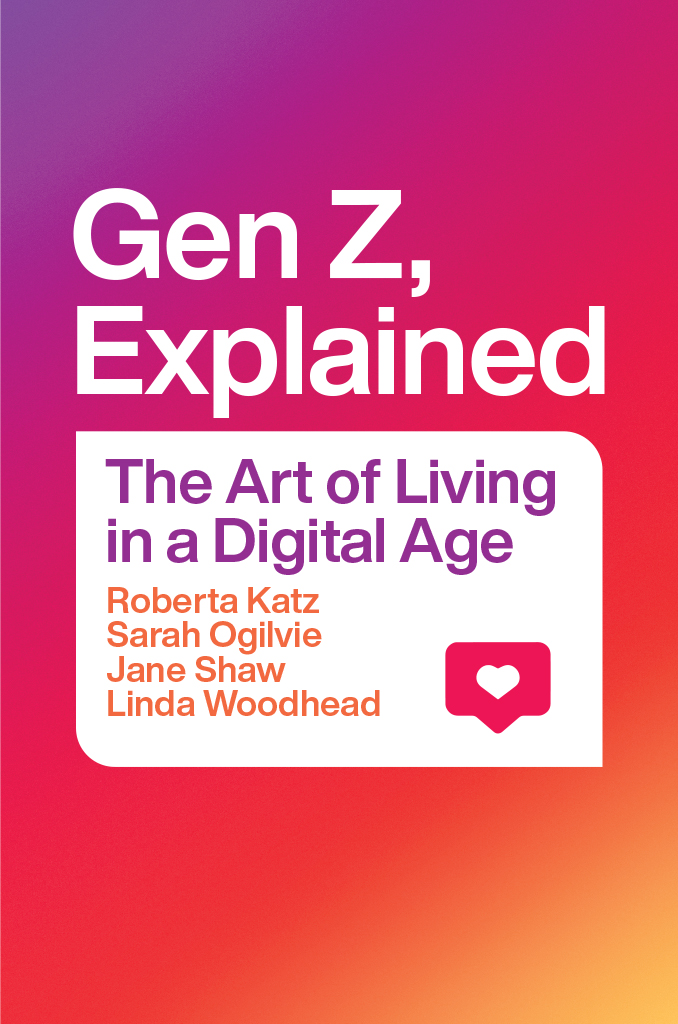
GEN Z, EXPLAINED
Gen Z, Explained
THE ART OF LIVING IN A DIGITAL AGE
Roberta Katz, Sarah Ogilvie, Jane Shaw & Linda Woodhead
THE UNIVERSITY OF CHICAGO PRESS
Chicago and London
The University of Chicago Press, Chicago 60637
The University of Chicago Press, Ltd., London
2021 by Roberta Katz, Sarah Ogilvie, Jane Shaw, and Linda Woodhead
All rights reserved. No part of this book may be used or reproduced in any manner whatsoever without written permission, except in the case of brief quotations in critical articles and reviews. For more information, contact the University of Chicago Press, 1427 E. 60th St., Chicago, IL 60637.
Published 2021
Printed in the United States of America
30 29 28 27 26 25 24 23 22 21 1 2 3 4 5
ISBN-13: 978-0-226-79153-1 (cloth)
ISBN-13: 978-0-226-81498-8 (e-book)
DOI: https://doi.org/10.7208/chicago/9780226814988.001.0001
Library of Congress Cataloging-in-Publication Data
Names: Katz, Roberta R., author. | Ogilvie, Sarah, author. | Shaw, Jane, 1963, author. | Woodhead, Linda, author.
Title: Gen Z, explained : the art of living in a digital age / Roberta Katz, Sarah Ogilvie, Jane Shaw, and Linda Woodhead.
Description: Chicago ; London : The University of Chicago Press, 2021. | Includes bibliographical references and index.
Identifiers: LCCN 2021016935 | ISBN 9780226791531 (cloth) | ISBN 9780226814988 (ebook)
Subjects: LCSH: Generation Z. | Generation ZAttitudes. | Social change. | Social values. | Technology and youth.
Classification: LCC HQ799.5 .K37 2021 | DDC 305.242dc23
LC record available at https://lccn.loc.gov/2021016935
 This paper meets the requirements of ANSI / NISO Z39.48-1992 (Permanence of Paper).
This paper meets the requirements of ANSI / NISO Z39.48-1992 (Permanence of Paper).
For Margaret Levi
dear friend and colleague
Contents
WHY A BOOK ON GEN ZERS?
Gen Zers, also called postmillennials, Zoomers, or iGen-ers, are the first generation never to know the world without the internet. The oldest Gen Zers, now in their midtwenties, were born around the time the World Wide Web made its public debut in 1995. They are therefore the first generation to have grown up only knowing the world with the possibility of endless information and infinite connectivity of the digital age.
Gen Zers are shaped by and encounter the world in a radically different way from those who know what life was like without the internet; they seamlessly blend their offline and online worlds. They have had to navigate this new digital world largely without the guidance of their elders, and so they have learned how to make their way within this fast-moving, digital environment on their own. This has led to a range of daily practices that are distinctive to themthough increasingly adopted by others, a trend that was accelerated during the COVID-19 pandemic, when so many more aspects of everyones lives went online. The COVID Age is a digital age; it marks the moment when the rest of society began to catch up with Gen Zers who, with their tech savvy, lead the way.
This book is about the distinctive ways of being, values, and worldview that are shared by many Gen Zers. It tells their stories in their own words, their memes, and much more. We do not claim that this is a definitive study of this generation; it is, rather, a snapshot of some Gen Zers lives in the years 20162020, exploring who they are and how they go about their daily lives. It also uses the lens of Gen Z to think about the issues facing our world today, including the paradoxes and pressures we all encounter, by looking at what Gen Zers see as the big concerns and how they address them. In that sense, it is also a book in which we hope not only to reflect Gen Z lives but also to understand how they are seeking to mend so many broken aspects of our world.
HOW WE CAME TO WRITE THE BOOK
All four of us work at universities, and over a conversation one afternoon on the Stanford campus in spring 2016, we found ourselves sharing anecdotes about our experiences of postmillennial students. We had all noticed that, in recent years, incoming students were strikingly different from those from a few years before. They had a new vocabulary for talking about their identities and their places of belonging; they were hardworking but also placed an emphasis on their well-being and self-care; and they engaged in activism in a distinctively nonhierarchical, collaborative manner.
By the end of that conversation, curious about the distinctly different ways in which postmillennials express themselves, we decided to engage in our own collaborative work. We would use the combined methods of our fields of anthropology, linguistics, history, sociology, and religious studies to devise a study that would collect data, establish facts, and shed light on the broader historical context to understand better just what was going on with kids these days. We then immersed ourselves in the worlds of eighteen- to twenty-five-year-olds through interviews and surveys in both the US and UK. We also created the iGen Corpus, a seventy-million-word collection of the language used by Gen Z. Out of that collaborative work came this book.
Using their own words, we show how Gen Zers have gone beyond navigating this new world to harnessing it to achieve a workable coherence of beliefs and values, identity and belonging. We show how they use the vast expansion of information and options on the internet to find like-minded people with whom to cluster and, through such exploration, discover, refine, and create their own identities. We explore the values they have forged to guide them in this new and uncharted territory, and we show how important those values are to maintaining the stability and security they seek. We uncover their preferences for new ways of relating and acting when authority has seemingly become dispensable and the distinction between offline and online has become obscured. Finally, we discuss the tensions and pressures that Gen Zers are experiencing as they move through this world in transition, along with their fears and hopes about the future.
Ultimately, what we first noticed in our work on campuses represents something far more significant than a mere shift between generations. The story of the Gen Zers that we narrate here serves as a focusing lens; it crystallizes and reveals changes and tensions that have been present in society for some time. The postmillennials and the culture they are creating reflect back to us how they arein their distinctive waystruggling with the innovations, failures, and contradictions of our society, many of which are inherited from the latter half of the twentieth century and affect all of us.
The experience of Gen Zers is therefore often paradoxical, even contradictory. They have more voice than ever before (e.g., a meme or a YouTube or TikTok video can reach hundreds of thousands, even millions), but they also have a sense of diminished agency in real life (e.g., institutions and political and economic systems seem locked, inaccessible to them, and wrongheaded). They are often optimistic about their own generation but deeply pessimistic about the problems they have inherited: climate change, violence, racial and gender injustice, failures of the political system, and little chance of owning a home or improving on their parents level of affluence.
Gen Zers navigate these paradoxes using the newusually digitaltools that they have at hand. We highlight three main strategies. First, they are very clear about who they are, and they use that clarity of identity to self-define and push back against unwanted pressures and demands (e.g., no, thats not appropriate to who I am). Second, they join (mainly online) communities that fit, support, and help refine their personal and collective identity, purpose, and (for some) activism. Third, they reject hierarchy and embrace wider distributions of voice and power on the basis of equality and collaboration and having a clear set of values.
Next page
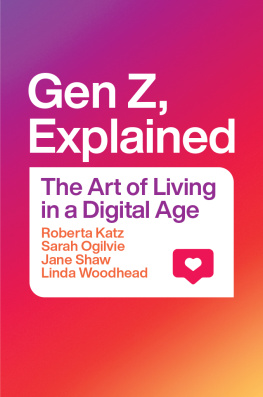

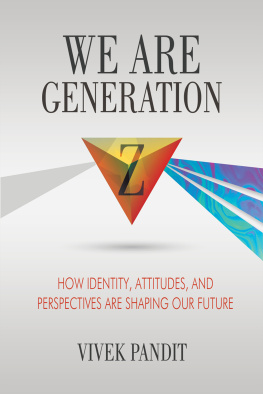
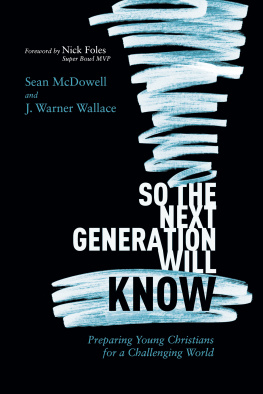


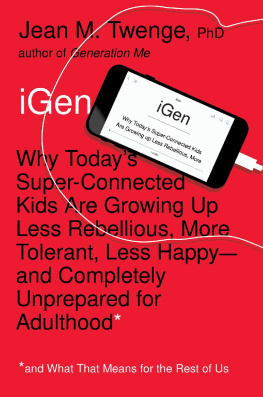

 This paper meets the requirements of ANSI / NISO Z39.48-1992 (Permanence of Paper).
This paper meets the requirements of ANSI / NISO Z39.48-1992 (Permanence of Paper).